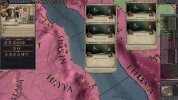Male character with only one prosperous province:

Female character with only one non-prosperous province:

Female character with only one prosperous province:

All characters responded correctly for their sex, but did not respond correctly for province prosperity. (You can see a province's prosperity by looking for the relevant 3D thingamajig on the main map.)
I had no errors in error.log, except for the missing event pictures.
Not pictured:
- Repeating the same tests for the same character several times to see if they were choosing randomly (they weren't).
- Earlier more-limited tests, for 3-4 other characters, with the same results.
- Tests for characters with more than one province
- Because, although you can hardcode localisation text into events, apparently scopes don't work in that localisation text, so the output event text is not very helpful for characters with >1 province.





